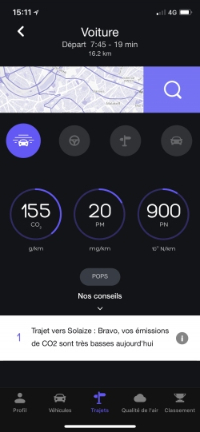03.05.2018
5 minutes of reading
Air pollution caused by fine particles from vehicle traffic poses a real public health problem.
While the impact of diesel vehicles is now well established, other sources of emissions are less well known, including direct-injection petrol engines but also wear on tires, brake pads and road surfaces. All vehicles are affected by non-exhaust emissions of this kind, including electric ones.
Developed by IFP Energies nouvelles in 2016, the eco-driving application Geco air raises awareness and helps drivers to reduce their pollution footprint. Initially designed to help individual users become “eco-drivers” by measuring their emissions of pollutants (NOx and CO) and CO2, Geco air includes new algorithms that can be used to estimate total emissions of fine particles, including non-exhaust emissions, associated with car journeys.
Two poorly understood sources of fine particles
Wear on tires and brakes produces fine particles, which depend on the type of journey, weather and driving style. They are in the region of 10 to 40 mg/km traveled, higher than the levels of exhaust emissions from recent vehicles, either petrol or diesel. The European standard on pollution sets a limit of 4.5 mg/km traveled for exhaust emissions. According to an Airparif study carried out in 2015, non-exhaust emissions are thought to represent 41% of fine particles in suspension due to road traffic in the Greater Paris region.
The new direct-injection petrol models (43% of the European petrol vehicle fleet and almost the entire market for new vehicles) also emit very fine particles, sometimes up to 10 times more than recent diesel engines. As for diesel cars, a particle filter exists but rolling it out across the board is a gradual process.
What are ‘fine’ and ‘very fine’ particles?F
Fine particles are less than 2.5 microns in diameter, while very fine particles are less than 1 micron (smaller than a virus or a molecule); ultra-fine particles are less than 0.1 micron in diameter. The finer particles are, the more dangerous they become, since they can enter the respiratory system. Since calculating the mass of very fine particles is not significant, we need to estimate their number. This is one of the functionalities in the new version of Geco air.
How do you reduce particle emissions associated with wear on tires and brakes?
Geco air can now calculate emissions of fine particles associated with wear on tires and brakes as part of measuring the environmental footprint of each driver’s journey.
- A dynamic model of the vehicle takes account of its specific characteristics (mass, center of gravity, size of tires, etc.).
- Based on the journey information provided by the GPS system every second, the model estimates the force applied to each of the vehicle’s wheels, to calculate the wear on various components and the resulting emissions of fine particles, in real time.
- These emissions are then included when calculating the “clean mobility score” for each journey.
Depending on your driving style (sudden braking and acceleration, level of anticipation, etc.), emissions levels from wear and tear can increase by 100%!
Direct-injection petrol vehicles: how does Geco air contribute?
The new version of Geco air includes a particles emissions modelspecific to direct-injection petrol vehicles. Its estimates are based on number rather than mass, which allows very fine particles to be included. Drivers also get a mobility score for each of their journeys, along with advice on eco-friendly driving to reduce their pollutant footprint.
By following Geco air’s eco-mobility advice, you can reduce your vehicle’s particles emissions by 25 to 75%
|
Geco air calculates the ideal driving style to adopt, compared with your usual driving, in real time and based on the journey you are making. As a result, Geco airindicates the potential for reducing your footprint of polluting emissions (NOx, CO and particles) and CO2. |

|
|
|
|
|
|
|
|
|
|
|
More information: www.gecoair.fr








